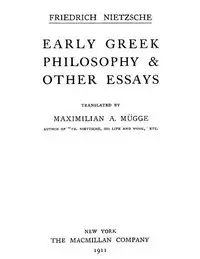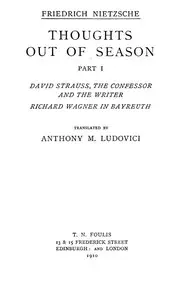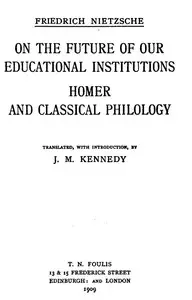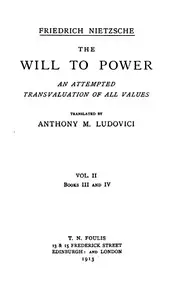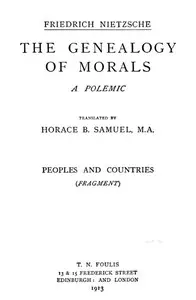"Thoughts Out of Season, Part II" by Friedrich Wilhelm Nietzsche is a philosophical exploration written in the 1800s that presents two main essays, one looking at how history is used and misused, and the other focused on the philosopher Schopenhauer and his role as an educator. It investigates Nietzsche's complaints about how people think about history and philosophy and is pushing for a more energetic and positive way of living. The book begins by talking about the problems with focusing too much on history, which Nietzsche sees as something that can stop people from taking action and being lively. He says that when people think too much about the past, it keeps them from fully enjoying the present. Nietzsche also talks about how forgetting things can be important for living a good life, arguing that being able to ignore the past to a certain degree can make people happier. He uses strong images to make his point, like comparing people weighed down by history to animals that live in the moment. This part of the book makes it clear that Nietzsche thinks history is useful, but it shouldn't control people's lives. Instead, it should help them thrive by learning from the past without being trapped by it.
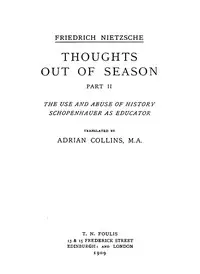
Thoughts Out of Season, Part II
By Friedrich Wilhelm Nietzsche
A philosopher argues that too much focus on the past can hinder our ability to live fully in the present, calling for a more life-affirming approach.
Summary
About the AuthorFriedrich Wilhelm Nietzsche was a German classical scholar, philosopher, and critic of culture, who became one of the most influential of all modern thinkers. He began his career as a classical philologist before turning to philosophy. He became the youngest person to hold the Chair of Classical Philology at the University of Basel in Switzerland in 1869, at the age of 24, but resigned in 1879 due to health problems that plagued him most of his life; he completed much of his core writing in the following decade. In 1889, at age 44, he suffered a collapse and afterward a complete loss of his mental faculties, with paralysis and probably vascular dementia. He lived his remaining years in the care of his mother until her death in 1897, and then with his sister Elisabeth Förster-Nietzsche. Nietzsche died in 1900, after experiencing pneumonia and multiple strokes.
Friedrich Wilhelm Nietzsche was a German classical scholar, philosopher, and critic of culture, who became one of the most influential of all modern thinkers. He began his career as a classical philologist before turning to philosophy. He became the youngest person to hold the Chair of Classical Philology at the University of Basel in Switzerland in 1869, at the age of 24, but resigned in 1879 due to health problems that plagued him most of his life; he completed much of his core writing in the following decade. In 1889, at age 44, he suffered a collapse and afterward a complete loss of his mental faculties, with paralysis and probably vascular dementia. He lived his remaining years in the care of his mother until her death in 1897, and then with his sister Elisabeth Förster-Nietzsche. Nietzsche died in 1900, after experiencing pneumonia and multiple strokes.



